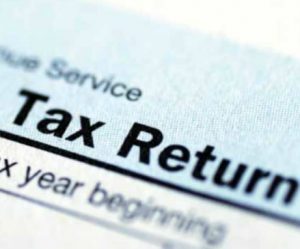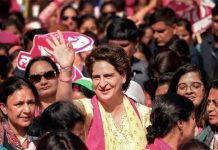 The three elections that BJP lost from Hindi heartland of Madhya Pradesh, Rajasthan and Chhattisgarh were perhaps a wake up call for Modi Government. It first announced 10 per cent reservation for upper castes on economic grounds and then has tried to win over the farming community, the salaried class and the pensioners. Agrarian distress was a crucial factor that led to the BJP losing out to the Congress in the Hindi heartland states of Rajasthan, Chhattisgarh and Madhya Pradesh.
The three elections that BJP lost from Hindi heartland of Madhya Pradesh, Rajasthan and Chhattisgarh were perhaps a wake up call for Modi Government. It first announced 10 per cent reservation for upper castes on economic grounds and then has tried to win over the farming community, the salaried class and the pensioners. Agrarian distress was a crucial factor that led to the BJP losing out to the Congress in the Hindi heartland states of Rajasthan, Chhattisgarh and Madhya Pradesh.
The Congress again took an initiative and announced a loan waiver in Punjab where it came to power in 2017 dethroning Shiromani Akali Dal-BJP alliance government. Rajasthan, Madhya Pradesh and Chhattisgarh followed with loan waivers. Naturally, it was but expected from the Modi government was to steal a march over opposition to announce a populist Budget. The government has now come up with Pradhan Mantri Kisan Samman Nidhi, a scheme for direct benefit transfer of 6,000 to small and marginal farmers. The government has also announced sops for lower middle class, by doubling the threshold income tax rebate limit to 5 lakh. A mega pension scheme has been announced for the unorganised sector. According to financial wizards, this was necessitated by the Congress Party Chief’s announcement of its ‘guaranteed minimum income’ promise.
No doubt that the Interim Budget 2019 has the inkling of the upcoming general election. It shows that a lot of thought has gone into identifying and targeting the sections of population across social segments that were perhaps unhappy with the Centre and gave vent to their pent-up feelings in the Assembly elections to three states that were pinned as a sort of semi-final before the 2019 general elections. There is an income support scheme for farmers and a pension scheme for informal sector workers earning up to 15,000 a month. There are income tax concessions for the middle class that have been carefully framed to target the lower rung. The 6,000 a year support to farmers will benefit 12 crore households, which is almost half of the total number of households. The personal Income Tax rebate on those with taxable annual income of up to five lakh a year will benefit three crore middle class voters. The housing-related tax proposals can boost real estate sector, which is a job-creator and is spread across all states.
Interim Budget 2019-20 was presented in Parliament by the Union Minister for Finance, Corporate Affairs, Railways & Coal, Piyush Goyal. Besides having a major Scheme for the farmers, it provides tax sops and sets the Developmental Agenda for the years to come. A new deal for 12 crore small and marginal farmers with direct income support, a path breaking pension initiative for 10 crore unorganised sector workers, exempting income up to 5 lakhs from Income Tax, reforms in stamp duty, highest ever budgetary allocation of 3 lakh crore for Defence, record allocation of funds at 58,166 crore for North Eastern Areas, a new AIIMS for Haryana, single window clearance for Indian film makers at par with foreigners and higher budgetary allocations for Education, Health, Infrastructure and for the welfare of weaker sections including Scheduled Castes and Scheduled Tribes, a Separate Department of Fisheries for welfare of 1.5 crore fisherman are some of the major highlights of the Interim Budget 2019-20.
New Scheme — Pradhan Mantri Kisan Samman Nidhi (PN-KISAN) to extend direct income support at the rate of Rs. 6,000 per year to farmer families, having cultivable land upto 2 hectares is announced. While presenting the Interim Budget 2019-20, Piyush Goyal said, “Our government is launching a historic programme PM-KISAN with an outlay of 75,000 crore for the financial year 2019-20 and 20,000 crore in the Revised Estimates of 2018-19”.
Under this Government of India funded Scheme, 2,000 each will be transferred to the bank accounts of around 12 crore small and marginal farmer families, in three equal installments. This programme would be made effective from 1st December 2018 and the first installment for the period upto 31st March 2019 would be paid during this year itself.
To provide an assured income support to the small and marginal farmers, the government is launching the Pradhan Mantri Kisan Samman Nidhi (PM-KISAN). Under this programme, vulnerable landholding farmer families, having cultivable land upto 2 hectares, will be provided direct income support at the rate of 6,000 per year. This income support will be transferred directly into the bank accounts of beneficiary farmers, in three equal instalments of 2,000 each. This programme will be funded by Government of India. Around 12 crore small and marginal farmer families are expected to benefit from this. The programme would be made effective from 1st December 2018 and the first installment for the period upto 31st March 2019 would be paid during this year itself. This programme will entail an annual expenditure of 75,000 crore”. PM-KISAN would not only provide assured supplemental income to the most vulnerable farmer families, but would also meet their emergent needs especially before the harvest season. PM-KISAN would pave the way for the farmers to earn and live a respectable living.
To provide sustained and focused attention towards development of Fisheries, the Government has decided to create a separate Department of Fisheries. Finance Minister said that through the measure, the government wants to promote further growth over 7 per cent to promote livelihood of about 1.45 crore people dependent on the sector. The finance minister announced 2 per cent interest subvention to the farmers pursuing the activities of animal husbandry and fisheries, who avail loan through Kisan Credit Card. Further, in case of timely repayment of loan, they will also get an additional 3 per cent interest subvention.
Allocation of 750 crore for Rashtriya Gokul Mission has been announced for the current year itself. Setting up of “Rashtriya Kamdhenu Aayog” to upscale sustainable genetic upgradation of cow resources and to enhance production and productivity of cows has also been announced. The Aayog will also look after effective implementation of laws and welfare schemes for cow.
To provide pensionary benefits to at least 10 crore labourers and workers in the unorganised sector a new Scheme called Pradhan Mantri Shram Yogi Maandhan is announced. The Finance Minister said that within next five years it would be one of the largest pension schemes of the world. A sum of 500 crore has been allocated for the Scheme. Additional funds will be provided as needed, Goyal added. The scheme will also be implemented from the current year, he said.
Individual taxpayers having taxable annual income up to 5 lakhs will not be required to pay any income tax. The Finance Minister said that persons having gross income up to 6.50 lakhs are not required to pay any income tax if they make investments in provident funds, specified savings and insurance etc. Additional deductions such as interest on home loan up to 2 lakh, interest on education loans, National Pension Scheme contributions, medical insurance and medical expenditure on senior citizens etc, are also provided for in the Interim Budget 2019-20. Thus tax benefit of 18,500 crore is proposed to be provided to an estimated 3 crore middle class and small taxpayers comprising self employed, small business, small traders, salary earners, pensioners and senior citizens.
For salaried persons, Standard Deduction is being raised from the current 40,000 to 50,000. This will provide additional tax benefit of 4,700 crore to more than 3 crore salary earners and pensioners. Exemption on levy of income tax on notional rent on a second self-occupied house is also now proposed. Currently, income tax on notional rent is payable if one has more than one self-occupied house.
Individual taxpayers having taxable annual income up to 5 lakhs will get full tax rebate and therefore will not be required to pay any income tax. While presenting the Interim Budget 2019-20 in Parliament today the Union Minister for Finance, Corporate Affairs, Railways & Coal, Shri Piyush Goyal said “Because of major tax reforms undertaken by us during last four and half years, both tax collections as well as tax base have shown significant increase, achieving a moderate taxation- high compliance regime. It is, therefore, just and fair that some benefits from the tax reforms must also be passed on to the middle class taxpayers”.
As a result, the Finance Minister added that even persons having gross income up to 6.50 lakhs may not be required to pay any income tax if they make investments in provident funds, specified savings, insurance etc. In fact, with additional deductions such as interest on home loan up to 2 lakh, interest on education loans, National Pension Scheme contributions, medical insurance, medical expenditure on senior citizens etc, persons having even higher income will not have to pay any tax. This will provide tax benefit of 18,500 crore to an estimated 3 crore middle class taxpayers comprising self employed, small business, small traders, salary earners, pensioners and senior citizens.
For salaried persons, Standard Deduction is being raised from the current 40,000 to 50,000. “This will provide additional tax benefit of 4,700 crore to more than 3 crore salary earners and pensioners”, the Finance Minister informed.
Tax Deduction at Source (TDS) threshold on interest earned on bank/post office deposits has been proposed to be raised from 10,000 to 40,000. Shri Goyal said, “This will benefit small depositors and non-working spouses”. Further, the TDS threshold for deduction of tax on rent has also been proposed to be increased from 1,80,000 to 2,40,000 for providing relief to small taxpayers.
TDS threshold on interest earned on bank/post office deposits is being raised from 10, 000 to 40, 000. The TDS threshold for deduction of tax on rent is proposed to be increased from 1, 80,000 to 2, 40, 000 for providing relief to small taxpayers.
The finance minister says that the government wants the GST burden on home buyers to be reduced and accordingly the GST Council was moved to appoint a Group of Ministers to examine and make recommendations in this regard at the earliest. Goyal said that soon, businesses comprising over 90 per cent of GST payers will be allowed to file quarterly return.
Relief to house owners
It has been proposed to exempt the levy of income tax on notional rent on a second self-occupied house. Currently, income tax on notional rent is payable if one has more than one self-occupied house. Goyal announced the relief considering the difficulty of the middle class having to maintain families at two locations on account of their job, children’s education, care of parents etc. Further, the Finance Minister proposed to increase the benefit of rollover of capital gains under Section 54 of the Income Tax Act from investment in one residential house to two residential houses for a taxpayer having capital gains up to 2 crore. This benefit can be availed once in a life time. For making more homes available under affordable housing, the benefits under Section 80-IBA of the Income Tax Act is being extended for one more year, i.e., to the housing projects approved till 31st March, 2020. Also, for giving impetus to the real estate sector, the Finance Minister proposed to extend the period of exemption from levy of tax on notional rent, on unsold inventories, from one year to two years, from the end of the year in which the project is completed.
The finance minister said that the government has been successful in bringing down average inflation to 4.6 per cent over last five years, which is lower than the inflation during the tenure of any other Government. In fact Inflation in December 2018 was down to 2.19 per cent only. Goyal said if we had not controlled inflation, our families would have been spending around 35-40 per cent more today on basic necessities such as food, travel, consumer durables, housing etc. The average rate of inflation during previous five years 2009-2014 was a backbreaking 10.1 per cent, he pointed out.
The fiscal deficit has been brought down to 3.4 per cent in 2018-19 RE from the high of almost 6 per cent seven years ago, the Finance Minister mentioned. He said the Current Account Deficit (CAD), against a high of 5.6 per cent six years ago, is likely to be only 2.5 per cent of GDP this year. “We contained the fiscal deficit notwithstanding the Finance Commission’s recommendations increasing the share of the States from 32 per cent to 42 per cent in central taxes, which we accepted in the true spirit of cooperative federalism, thereby transferring significantly higher amounts to the States”, Goyal said.
Growth and FDI
Goyal stated that a stage for high growth in decades to come, has now been set, after a wave of next generation path breaking structural reforms over the last five years, including introduction of Goods and Services Tax (GST) and other taxation reforms. The country witnessed its best phase of macro-economic stability during the last five years. “We are the fastest growing major economy in the world with an annual average GDP growth during last five years higher than the growth achieved by any Government since economic reforms began in 1991. From being the 11th largest economy in the world in 2013-14, we are today the 6th largest in the world”, the finance minister asserted in his Opening Remarks of his Budget speech.
He said that due to such a stable and predictable regulatory regime, growing economy and strong fundamentals, India could attract massive amount of as much as $239 billion of Foreign Direct Investment (FDI) during the last 5 years, when most of the FDI was allowed to come in through the automatic route. Announcing an allocation of 60,000 crores for MGNREGA for Budget Estimates 2019-20, the minister said that additional allocations will be made, if required.
Fiscal deficit
The Interim Budget 2019-20 has pegged the fiscal deficit for the year 2019-20 at 3.4 per cent of GDP. While presenting the Interim Budget 2019-20 in Parliament today, Union Minister for Finance, Corporate Affairs, Railways and Coal, Shri Piyush Goyal said, “The estimate of incomes and expenditure which I am presenting today, pegs the fiscal deficit of year 2019-20 at 3.4 per cent of GDP.” Goyal said in his Speech, “We would have maintained fiscal deficit at 3.3 per cent for year 2018-19 and taken further steps to consolidate fiscal deficit in year 2019-20. However, considering the need for income support to farmers, we have provided 20,000 crore in 2018-19 RE and 75,000 crore in 2019-20 BE. If we exclude this, the fiscal deficit would have been less than 3.3 per cent for 2018-19 and less than 3.1 per cent for year 2019-20.” The Macro-Economic Framework Statement says that the Revenue deficit in 2018-19 was budgeted at 4, 16, 034 crore, 2.2 per cent of GDP. On the other hand, the Current Account Deficit widened to 2.7 per cent of GDP in first half of 2018-19 from 1.9 per cent of GDP in 2017-18, mainly on account of higher trade deficit arising from higher petroleum, oil and lubricants imports. Despite the marginal increase, the fiscal deficit to GDP ratio is well on track to achieve its target level of 3 per cent of GDP.
The main focus of the ensuing year will be to improve the expenditure efficiency and improve tax collections to ensure that the economy moves back to the fiscal deficit path as mentioned in the Fiscal Responsibility & Budget Management (FRBM) Act, says the Medium-Term Fiscal Policy cum Fiscal Policy Strategy Statement. Further, the above document says that the Gross Tax Revenue of the Central Government is budgeted at 25,52,131 crore in BE 2019-20. This reflects a growth of 3, 03, 956 crore (13.5 per cent) over RE 2018-19.
The Direct Taxes are expected to reach 13, 80, 000 crore in BE 2019-20 compared to 12, 00, 000 crore in RE 2018-19 indicating an increase of 15 per cent over RE. It is expected that direct taxes would be 6.6 per cent of GDP at the end of 2019-20. Indirect taxes are budgeted at 11, 66, 188 crore in BE 2019-20 showing an increase of 11.8 per cent over RE estimates (10, 42, 833 crore). The increase is mainly on account of improvement in GST collections anticipated in 2019-20.
Non-tax revenue collections in 2019-20 is budgeted at 2, 72, 647 crore as compared to 2, 45, 276 crore in RE 2018-19. This shows an increase of 27, 371 crore over RE 2018- 19, as per the Medium Term Fiscal Policy cum Fiscal Policy Strategy Statement. The finance minister, in his Budget Speech, said that the total expenditure has reflected a high increase considering low inflation. It has risen by 3, 26, 965 crore or approximately 13.30 per cent, from 24,57,235 crore in 2018-19 RE to 27, 84,200 crore in 2019-20 BE. Further, 2018-19 RE figures have shown an increase over BE 2018-19 figures by 15,022 crore. The Capital Expenditure for 2019-20 BE is estimated to be 3,36, 292 crore. The increase in total expenditure is on account of increased support to agricultural sector, interest payments and internal security, as per the ‘Budget at a Glance’ document.
In BE 2019-20, Centrally Sponsored Schemes (CSS) are proposed to be allocated 3, 27, 679 crore as against 3, 04, 849 crore in 2018-19 RE. Detailing further, Shri Goyal said in his Speech that allocation for National Education Mission is being increased from 32, 334 crore in RE 2018-19 to 38, 572 crore in BE 2019-20. Also, allocation for Integrated Child Development Scheme (ICDS) is being increased from 23, 357 crore in RE 2018-19 to 27, 584 crore in BE 2019-20.
“A substantial increase is proposed in the allocation for welfare of the Scheduled Castes and Scheduled Tribes,” said Goyal. The allocation of 56, 619 crore made in BE of 2018-19 for Scheduled Caste, further increased to 62, 474 crore in RE is proposed to be enhanced to 76, 801 crore in BE for 2019-20, an increase of 35.6 per cent over BE of 2018-19. For the Scheduled Tribes also, proposed allocation in 2019-20 BE is 50, 086 crore as against 39,135 crore in BE 2018-19, an increase of 28 per cent.
Regarding Disinvestment proceeds, the government is confident of crossing the target of 80, 000 crore this year and have kept a target of 90, 000 crore in BE 2019-20, as per the ‘Budget at a Glance’ document. Shri Goyal said in his Speech, “We have pursued the public enterprises asset management agenda to make these enterprises accountable to the people. As many as 57 CPSEs are now listed with total market capitalisation of over 13 lakh crore. The government received over 1 lakh crore from disinvestment proceeds during 2017-18.”
As per the Medium Term Fiscal Policy cum Fiscal Policy Strategy Statement, Non-Debt capital receipts on capital side are expected to be 1, 02, 508 crore in BE 2019-20 indicating an increase of 9, 353 crore over RE 2018-19. Increase in non-debt capital receipts is mostly on account of disinvestment which is budgeted at 90, 000 crore (RE 2018-19 — 80, 000 crore). Total net borrowings in 2019-20 are projected at 7, 03, 999 crore as compared to 6, 34, 398 crore in RE 2018-19. This reflects an increase of 11 per cent over RE.
The government had promised last year that it would carry out reforms in stamp duty levied and collected on financial securities transactions. Goyal said in his Speech, “I am proposing, through the Finance Bill, necessary amendments in this regard. The amendments proposed would usher in a very streamlined system. Stamp duties would be levied on one instrument relating to one transaction and get collected at one place through the Stock Exchanges. The duty so collected will be shared with the State Governments seamlessly on the basis of domicile of buying client.”
While giving a vision for fiscal consolidation, Goyal said in his Speech, “We have maintained the glide path towards our target of 3 per cent of fiscal deficit to be achieved by 2020-21”. The government will now focus on Debt consolidation along with completion of the fiscal deficit consolidation programme. India’s Debt to GDP ratio was 46.5 per cent in year 2017-18. The FRBM Act prescribes that the Debt to GDP ratio of the government of India should be brought down to 40 per cent by 2024-25, the minister added.
The Pradhan Mantri Gram Sadak Yojana (PMGSY) is being allocated 19, 000 crore in BE 2019-20 as against 15,500 crore in 2018-19. During the period 2014-18, a total number of 1.53 crore houses have been built under the Pradhan Mantri Awas Yojana, he announced. By March, 2019, all households will be provided with electricity connection. Till now, 143 crore LED bulbs have been provided in a mission mode which has resulted in saving of 50, 000 crore for the poor and middle class.
Through the world’s largest healthcare programme, Ayushman Bharat, to provide medical treatment to nearly 50 crore people in the country, around 10 lakh patients have already benefited through free treatment for medical treatment which would have otherwise cost them 3, 000 crore. Lakhs of poor and middle class people are also benefiting from reduction in the prices of essential medicines, cardiac stents and knee implants, and availability of medicines at affordable prices through Pradhan Mantri Jan Aushadhi Kendras, the finance minister added. As many as 14 of the 21 AIIMS operating or being established in the country presently have been announced since 2014. He also announced setting up of a new – the 22nd AIIMS in Haryana.
Allocation for Integrated Child Development Scheme (ICDS) is being increased from 23, 357 crore in revised estimates (RE) of 2018-19 to 27, 584 crore in budget estimates (BE) 2019-20. A substantial increase is proposed in the allocation for welfare of the Scheduled Castes and Scheduled Tribes. The allocation of 56, 619 crore made in BE of 2018-19 for Scheduled Caste, further increased to 62, 474 crore is proposed to be enhanced to 76, 801 crore in BE for 2019-20, an increase of 35.6 per cent over BE of 2018-19. For the Scheduled Tribes also, proposed allocation in 2019-20 BE is 50, 086 crore as against 39, 135 crore in BE 2018-19, an increase of 28 per cent. The Finance Minister said that a Welfare Development Board to frame special strategies for the benefit of the hard-to-reach De-notified, Nomadic and Semi-Nomadic communities will be set up under the Ministry of Social Justice and Empowerment. He said that a Committee under NITI Aayog will also be set up to complete the task of identifying De-notified, Nomadic and Semi-Nomadic communities not yet formally classified.
Goyal said under the Ujjwala Yojana aiming delivery of 8 crore free LPG connections, more than 6 crore connections have already been given and the remaining will get free gas connections by next year. The finance minister announced that a National Artificial Intelligence Portal will also be developed soon as a part of the National Programme on ‘Artificial Intelligence’. The Department of Industrial Policy and Promotion will now be renamed as the Department for Promotion of Industries and Internal Trade.
The Finance Minister stated that the government e-Marketplace (GeM), created by the present Government two years ago, resulted in average savings of 25-28 per cent and the platform will now be extended to all CPSEs. Transactions of over 17, 500 crore have taken place so far.
Defence budget
The finance minister said that for the first time, the country’s Defence Budget will be of over 3 lakh crore. 3, 05, 296 crore have been provided in the Budget Estimates for 2019-20, compared to 2, 82, 733 crore provided in 2018-19 Budget Estimates. The figures were revised to 2, 85, 423 crore in the Revised Estimates of 2018-19. While presenting the Interim Budget 2019-20 in Parliament today the Union Minister for Finance, Corporate Affairs, Railways and Coal Piyush Goyal said “Our Defence Budget will be crossing 3, 00, 000 crore for the first time in 2019-20. For securing our borders and to maintain preparedness of the highest order, if necessary, additional funds would be provided.”
On the issue of strengthening Defence and National Security, the Interim Budget 2019-20 states that our soldiers protect our borders in tough conditions and they are our pride and honour. The Finance Minister Sh. Goyal said that due care has been taken of their honour. He said that the issue of One Rank One Pension (OROP) which was pending for the last forty years has been resolved. He said, “The previous Governments announced it in three budgets but sanctioned a mere 500 crore in 2014-15 Interim Budget; in contrast we have already disbursed over 35, 000 crore after implementing the Scheme in its’ true spirit. The government also announced substantial hike in the Military Service Pay (MSP) of all service personnel and special allowances given to Naval and Air Force personnel deployed in high risk duties.”
The finance minister pointed out that domestic air traffic passengers have doubled during the last five years, leading to large number of jobs also being created. The number of operational airports has crossed 100 with the commissioning of the Pakyong airport in Sikkim. Arunachal Pradesh came on the air map recently and Meghalaya, Tripura and Mizoram have come on India’s rail map for the first time.
Capital support from the budget for Indian Railways is proposed at 64, 587 crore in 2019-20 (BE). The Railways’ overall capital expenditure programme is of 1, 58, 658 crore. The finance minister, who is also holding the portfolio of Railway Ministry, announced that the Operating Ratio is expected to improve from 98.4 per cent in 2017-18 to 96.2 per cent in 2018-19 (RE) and further to 95 per cent in 2019-20 (BE).
India’s installed solar generation capacity has grown over ten times in last five years. Stating this, Goyal said that “our commitment to promote renewable energy is reflected in setting up the International Solar Alliance, the first treaty based international inter-governmental organisation headquartered in India. This sector is now creating lakhs of new age jobs, he added.
The minister announced that in Entertainment industry, which is a major employment generator, regulatory provisions will now rely more on self-declarations. To promote entertainment industry, the Single window clearance for ease of shooting films, now available only to foreigners, will also be made available to Indian filmmakers. “We will also introduce anti-camcording provisions in the Cinematograph Act to control the menace of piracy,” he said.
$5-trillion economy
“We are poised to become a Five Trillion Dollar Economy in the next five years and aspire to become a Ten Trillion Dollar Economy in the next 8 years thereafter”, Goyal said, adding that there has been a Growth of 18 per cent in Direct Tax Collections in 2017-18 and increase in tax base by as many as 1.06 crore people filing income tax returns for the first time in FY 2017-18, mainly on account of demonetisation. He said that he is proposing, through the Finance Bill, necessary amendments to levy Stamp duties on one instrument relating to one transaction and get collected at one place through the Stock Exchanges. The duty so collected will be shared with the State Governments seamlessly on the basis of domicile of buying client, he said.
In all the total expenditure is to increase from 24, 57, 235 crore in 2018-19 RE to 27, 84, 200 crore in 2019-20 BE. A rise f 3, 26, 965 crore or approximately 13.30 per cent. This reflects a high increase considering low inflation. The fiscal deficit of year 2019-20 is estimated to be 3.4 per cent of GDP. The finance minister pointed out that after completion of the fiscal deficit consolidation programme, the government would now focus on debt consolidation. He said “We have maintained the glide path towards our target of 3 per cent of fiscal deficit to be achieved by 2020-21.
India’s debt-to GDP ratio was 46.5 per cent in year 2017-18. The FRBM Act prescribes that the Debt to GDP ratio of the government of India should be brought down to 40 per cent by 2024-25. “Along with completion of the fiscal deficit consolidation programme, we will now focus on Debt consolidation,” he added.
India having emerged as the world leader in the consumption of mobile data, the government now aims to widen its impact by reaching out to the interior and rural areas. While presenting the Interim Budget 2019-20 in Parliament today, the Union Minister for Finance, Corporate Affairs, Railways and Coal, Piyush Goyal said the government will make one lakh villages into Digital Villages over next five years. This, he said, will be achieved by expanding the Common Service Centres (CSCs). “The Common Service Centres are expanding their services and also creating digital infrastructure in the villages, including connectivity, to convert the villages into Digital Villages,” said Shri Piyush Goyal. “More than 3 lakh Common Service Centres (CSCs) employing about 12 lakh people, are digitally delivering several services to the citizens,” he added.
The finance minister said mobile tariff in India is now possibly the lowest in the world, catapulting India as the world leader in the consumption of mobile data. “Monthly consumption of mobile data increased by over 50 times in the last five years. The cost of data and voice calls in India is now possibly the lowest in the world.”
Goyal said that the ‘Make in India’ programme has seen the country emerging as the new destination for mobile phone manufacturing industry. “Today, under Make in India, mobile and parts manufacturing companies have increased from 2 to more than 268 providing huge job opportunities,” he added. The Finance Minister termed the Jan Dhan-Aadhaar-Mobile (JAM) and Direct Benefit Transfer as game changers.
“Bank nationalisation was first done 50 years ago, but a large part of the country was still left out of the economic mainstream with no access to formal banking. In the last five years, nearly 34 crore Jan Dhan bank accounts were opened,” said Piyush Goyal. The finance minister said Aadhaar has ensured better targeted subsidies. “Aadhaar is now near universally implemented. This has helped ensure the poor and middle class receive the benefits of the government schemes directly in their bank accounts by eliminating middlemen,” he said.
Recognising India’s Entertainment Industry as a major job sector, the Finance Minister declared extension of single window clearance for film shoot to Indian filmmakers. “Single window clearance for ease of shooting films, available only to foreigners, is now going to be made available to Indian filmmakers as well,” said Goyal.
The Finance Minister also announced other measures to ease filmmaking and check piracy. “Regulatory provisions will rely more on self-declaration. We will also introduce anti-camcording provisions in the Cinematograph Act to control the menace of piracy,” he said.
Budget reaction
Former minister P.Chidambaram said that his “one line comment on the Budget is that it was not a Vote on Account but an Account for Votes”. Giving principal party Congress’s reaction to Budget, Chidambaram said that the Interim Finance Minister tested our patience by the longest Interim Budget Speech in recent memory. It was not an Interim Budget. It was a full-fledged Budget accompanied by an election campaign speech. By doing so, the government has trampled on time-honoured conventions.
The big takeaway is that the present government has further weakened fiscal stability. For the second year in succession the government has missed the Fiscal Deficit target. The revised estimate shows a slippage from 3.3 per cent to 3.4 per cent. Worse, for 2019-20 too, the government has proposed an FD of 3.4 per cent. The government has thrown the FRBM Act out of the window. Similarly, the government will end the year with a Current Account Deficit of 2.5 per cent as against the CAD in the previous year of 1.9 per cent.
Both numbers for the current year and the estimate of FD for 2019-20 point to incompetent fiscal management and a disdain for fiscal prudence. He said sarcastically that out of nowhere, the government has remembered the cows and announced a Scheme for their welfare and provided a grand sum of 750 crore. It has announced the setting up of a new Department of Fisheries. It has announced a new contributory pension scheme for 10 crore unorganized workers that promises a pension of 3000 per month on their attaining the age of 60 years and allotted a paltry sum of 500 crore. The question is, “if these were important and necessary interventions, what was the government doing for five years?”
The government’s desperation is proved by its announcement of the Farmers’ Income Support Scheme to provide a measly sum 6000 per year to every small/medium farmer. The Fiscal Deficit numbers are telling. By recklessly breaching fiscal discipline, the government will fund the Scheme this year entirely out of borrowed money of 20,000 crore. Next year too, the scheme will be funded entirely out of borrowed money of 75,000 crore. The former finance minister said, “While I welcome the support to farmers, I ask what about the non-farmer poor? What about the urban poor?” The new scheme is intended to help the farmer. He said that he would like to ask how the government will reach the money to the tenant-farmer and farm labourer who actually tills the land.
He said that the direct tax concessions were beyond the authority of the government that will lay down office in 100 days. They seem to have been added at the last hour after the Budget numbers were finalised. We will study them carefully in order to find out if they are in accord with the projections of revenue from income tax.
letters@tehelka.com


















